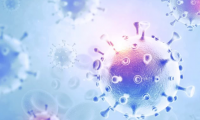-
Natural products and herbal medicines show promise in fight against COVID-19
- Source: drugdu
- 1,337
- November 18, 2020
-
Poor nutrition in school years may have created 20 cm height gap across nations
- Source: drugdu
- 284
- November 16, 2020
-
Discovery of novel hidden gene in SARS-CoV-2
- Source: drugdu
- 279
- November 14, 2020
-
Severe COVID-19 linked to age, body mass index and ABO blood group
- Source: drugdu
- 120
- November 13, 2020
-
Anvisa suspende temporariamente teste da vacina CoronaVac, que será produzida pelo Butantan
- Source: drugdu
- 393
- November 11, 2020
-
FDA warns of COVID-19 antigen test false positives as report flags Quidel on accuracy
- Source: drugdu
- 384
- November 9, 2020
-
COVID-19 lockdowns increase the number of polio cases in Pakistan
- Source: drugdu
- 218
- November 8, 2020
-
Rapid rise in CRP levels predicts COVID-19 outcomes
- Source: drugdu
- 344
- November 7, 2020
-
Fujifilm acquisition of Hitachi diagnostic imaging business delayed by COVID-19
- Source: drugdu
- 303
- November 6, 2020
-
Argentina agrees to buy 25 million doses of Russia’s Covid-19 vaccine
- Source: drugdu
- 290
- November 5, 2020
your submission has already been received.
OK
Subscribe
Please enter a valid Email address!
Submit
The most relevant industry news & insight will be sent to you every two weeks.












